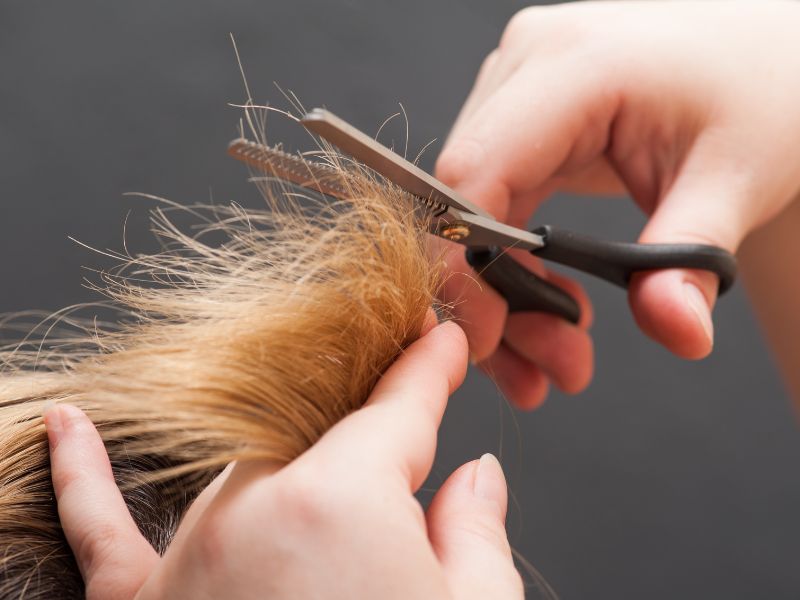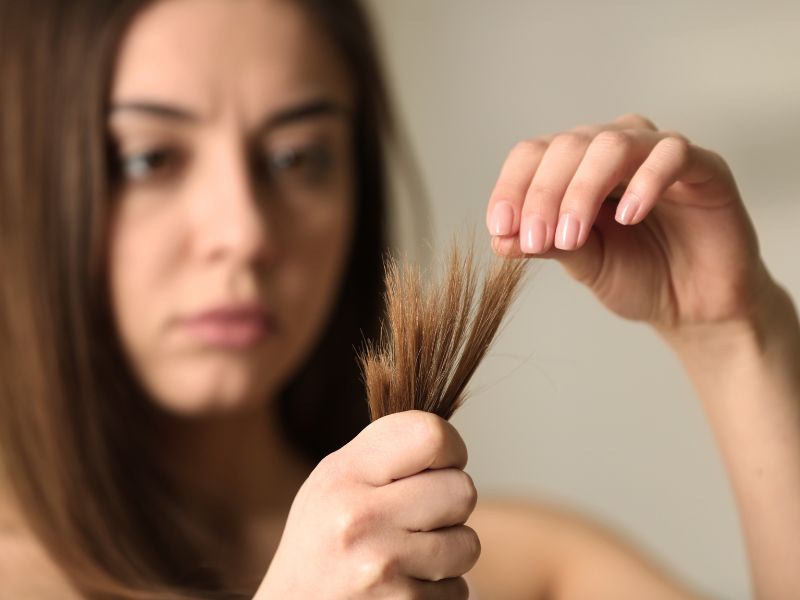Split ends are one of the most common signs of hair damage, often signaling a deeper need for better care and nourishment. Whether you have natural curls or straight strands, split ends can affect anyone, and they don’t just make hair look frizzy and messy—they can also hinder growth and overall hair health. Understanding what causes them and learning how to prevent them using natural methods is key to maintaining strong, beautiful hair.

Understanding Split Ends and Why They Happen
Split ends, also known as trichoptilosis, occur when the hair shaft splits or frays due to various types of stress or damage. They typically start at the ends of the hair, the oldest and most vulnerable part of the strand. Identifying the root causes of split ends helps build a routine that protects your hair from further harm.
What Are Split Ends?
Split ends are the result of the protective outer layer of the hair (cuticle) wearing away. This leaves the inner cortex exposed and vulnerable to splitting. There are several types, including basic splits (a simple Y shape), tree splits (with multiple offshoots), and feather splits (with many branches). These splits can travel up the shaft, leading to more extensive breakage and thinning.
Common Causes of Split Ends
-
Heat damage from styling tools: Excessive use of blow dryers, flat irons, and curling wands weakens the hair structure.
-
Overprocessed hair: Frequent coloring, relaxing, or perming damages the hair's protein structure.
-
Mechanical damage: Rough brushing, towel drying, and tight hairstyles can physically break hair fibers.
-
Environmental exposure: UV rays, pollution, and wind strip moisture and weaken the hair shaft.
-
Dry hair and lack of moisture: Without regular hydration, hair becomes brittle and more prone to splitting.
What Causes Split Ends in Natural Hair
Natural hair, especially type 3 and 4 textures, is particularly susceptible to split ends due to its structure and moisture needs. Contributing factors include:
-
Lack of regular hydration
-
Improper detangling techniques
-
Wearing hair loose without protective styling

How to Prevent Split Ends Naturally
Preventing split ends doesn't require harsh salon treatments or constant cutting. By adopting natural habits and using plant-based products, you can proactively reduce split ends and improve your overall hair health. Consistency and care are key to keeping your strands strong, smooth, and split-free.
Adopt a Gentle Hair Care Routine
Choose shampoos that are free of sulfates and drying alcohols to avoid stripping your hair of its natural oils. Gentle, eco-friendly hair care products help keep your strands hydrated and reduce the chance of damage. Try to limit hair washing to 2-3 times per week, based on your hair’s needs, to preserve moisture and natural oils.
Hair Trimming Routine
Trimming your hair regularly, ideally every 8 to 12 weeks, can prevent split ends from traveling up the hair shaft and causing more breakage. For those who want to retain length, consider "dusting," which involves trimming only the very tips of the hair to eliminate early splits while maintaining your style and growth.
Deep Conditioning for Split Ends
Incorporate deep conditioning treatments into your weekly hair care routine to repair and strengthen your strands. Use moisture-rich ingredients like honey, avocado, banana, and aloe vera to restore elasticity and hydration. These treatments help soften the ends and reduce brittleness, making your hair more resilient to future splits.
Best Oils to Prevent Split Ends Naturally
Using natural oils is one of the most effective and nourishing ways to protect your hair from split ends and seal in long-lasting moisture. These plant-based oils are rich in nutrients that not only hydrate the hair but also form a protective barrier to reduce breakage and damage.
-
Coconut oil: Known for its deep penetration into the hair shaft, coconut oil helps moisturize from within, reducing protein loss and strengthening the hair structure over time.
-
Argan oil: Packed with vitamin E and fatty acids, argan oil is ideal for sealing moisture into dry ends and adding a silky shine without leaving buildup. It also offers antioxidant protection against environmental stress.
-
Jojoba oil: Closely resembles the scalp's natural sebum, making it an excellent lightweight option for hydrating and softening the hair. It helps balance scalp health while protecting delicate ends.
-
Castor oil: Thick and rich in ricinoleic acid, castor oil boosts hydration and coats the hair cuticle, preventing moisture loss and shielding ends from friction.
-
Grapeseed oil: A lightweight alternative for fine or oily hair types, grapeseed oil contains linoleic acid, which helps strengthen and condition hair without weighing it down.
For best results, apply these oils after moisturizing your hair with water or a water-based leave-in conditioner. Focus especially on the ends of your hair, and gently press the oil into the strands to seal in moisture and protect against daily wear and tear.
Natural Remedies to Prevent Split Ends
Taking a natural approach to split-end prevention can be both effective and nourishing for your hair. These remedies focus on restoring moisture, strengthening the hair shaft, and protecting against further damage, all without relying on harsh chemicals. Here are some natural solutions to consider:
-
Aloe vera gel: Rich in enzymes and vitamins, aloe vera helps to condition the hair, soothe the scalp, and reduce frizz. It adds a protective layer that keeps moisture sealed in and split ends at bay.
-
Shea butter masks: Deeply moisturizing and loaded with vitamins A and E, shea butter penetrates the hair shaft to repair damage and restore elasticity. Use as a weekly mask to soften brittle ends.
-
Herbal rinses: Infusions made from rosemary, hibiscus, or chamomile tea can strengthen strands, stimulate scalp circulation, and smooth the cuticle. These rinses are ideal for boosting shine and reducing breakage.
-
Apple cider vinegar: When diluted with water, ACV helps balance the scalp’s pH, smooths the hair cuticle, and reduces tangling. This makes your hair more manageable and less prone to split ends.
-
Avocado and banana masks: These fruits are high in natural fats, vitamins, and minerals that help repair damaged hair. Combined in a mask, they add softness and resilience to dry, fragile strands.
Incorporating these treatments into your routine 1–2 times a week can significantly improve hair texture and help prevent split ends from forming. Always apply to clean, damp hair and follow with a light oil to seal in the nutrients.
How to Get Rid of Split Ends Without Cutting
While trimming remains the most reliable method to eliminate split ends completely, there are innovative options in 2025 for those who wish to delay cutting. Split end mender treatments have evolved with advanced formulations that include plant-based proteins, keratin, and silk amino acids. These ingredients work by temporarily bonding the frayed ends of hair, creating a smoother appearance and reducing further splitting.
-
Split end mender treatments: Look for products that contain hydrolyzed proteins or keratin that can reinforce the hair shaft and smooth split fibers.
-
Natural serums: Plant-based serums with ingredients like aloe vera, hibiscus extract, and vitamin E add moisture and temporarily seal the cuticle.
-
DIY hair masks: Weekly homemade treatments using gelatin, honey, or flaxseed can offer temporary sealing effects.
-
Leave-in conditioners: Daily use of a hydrating leave-in product can reduce friction and prevent splits from worsening.
-
Protective styling: Minimizing manipulation and using protective styles help retain the temporary repairs made by treatments.
These approaches won’t replace regular trims but can significantly improve the look and health of your hair between salon visits.

Tips for Stronger, Healthier Hair
Healthy hair truly begins from within, where the right nutrients and hydration provide the essential foundation for strength and resilience. Your external hair care choices also play a critical role—small, consistent improvements in your daily routine and product selections can make a significant difference in preventing damage and promoting growth.
Maintain a Balanced Diet and Hydration
A balanced diet rich in key nutrients supports healthy hair at the follicle level. Proteins form the structural building blocks of hair strands, while omega-3 fatty acids nourish the scalp and reduce inflammation that can inhibit growth. Essential vitamins such as biotin, vitamin A, and vitamin C help strengthen hair follicles, improve elasticity, and aid in repair processes. Staying well-hydrated by drinking plenty of water daily also boosts hair moisture from the inside out, reducing brittleness and split ends.
Choose Eco-Friendly Products for Split End Prevention
Selecting eco-friendly and clean beauty products is crucial for maintaining hair health while protecting the environment. These products avoid harmful ingredients like silicones, sulfates, parabens, and drying alcohols, which can strip natural oils, cause dryness, and weaken hair over time. Instead, they are formulated with nourishing, plant-based ingredients that gently support your hair and scalp’s natural balance, encouraging long-term strength, shine, and vitality. Incorporating sustainable options into your routine not only benefits your hair but also promotes responsible beauty practices.

Split ends may be common, but they don't have to be inevitable. By understanding what causes them and adopting a natural, gentle hair care routine, you can significantly reduce split ends and maintain healthier, longer hair. From deep conditioning and protective styles to nutrient-rich oils and eco-friendly products, small, consistent efforts go a long way in preventing damage. Prioritize moisture, minimize manipulation, and give your hair the love it needs to thrive naturally.
Check also:
FAQs
1. What causes split ends, and how do they affect hair health?
Split ends occur when the protective outer layer of the hair shaft wears away, causing the hair to fray and split at the ends. This damage weakens the hair, making it more prone to breakage and hindering healthy hair growth.
2. How often should I trim my hair to prevent split ends?
It is recommended to trim your hair every 8 to 12 weeks. Regular trims help remove damaged ends before splits travel up the hair shaft, preventing further breakage and maintaining healthier hair.
3. Can natural oils really help prevent split ends? If so, which oils are best?
Yes, natural oils like coconut oil, argan oil, jojoba oil, castor oil, and grapeseed oil are excellent for preventing split ends. They hydrate, nourish, and seal the hair ends, protecting them from moisture loss and daily damage.
4. Are there natural remedies to repair split ends without cutting?
While trimming is the most effective way to remove split ends, natural remedies such as split end mender treatments, plant-based serums, and DIY repair masks can temporarily seal and smooth split ends, improving their appearance until your next trim.
5. How can I prevent split ends on natural hair specifically?
For natural hair, prevention involves regular hydration, gentle detangling, protective styling, and avoiding harsh heat. Using moisturizing leave-ins, deep conditioning treatments, and sealing ends with oils also helps keep natural hair strong and split-end free.

For healthier, stronger hair free from split ends and damage, trust REV-320’s natural hair care products designed to nourish, hydrate, and protect your strands every day. Whether you’re looking for deep conditioning treatments, nourishing oils, or gentle cleansers, our eco-friendly formulas support your hair’s natural beauty and strength. Take control of your hair care routine and experience the benefits of natural, effective solutions. Contact us or order online today to start your journey toward healthier, more resilient hair with REV-320!


